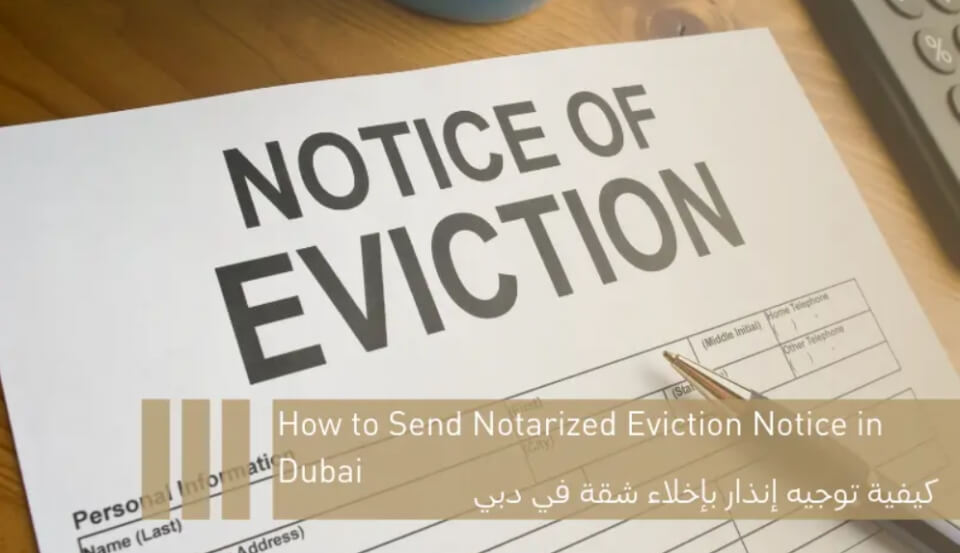Legal blog
Legal Notices in Dubai Rental Law

Introduction
Legal notices are an essential tool in regulating the relationship between landlords and tenants under tenancy contracts in Dubai. They ensure that the other party is informed of the intent to terminate the contract or to rectify a breach before taking legal action. The legislator has required the issuance of such notices in specific situations to ensure the protection of both parties’ rights and to allow the opportunity for correction or preparation.
This is consistent with the general principles of the UAE Civil Transactions Law, which requires that the debtor be given notice before termination; pursuant to Article (272) of Federal Civil Transactions Law No. 5 of 1985:
“In contracts binding on both parties, if one party fails to fulfil the contractual obligations, the other party may, after notifying the debtor, demand execution or termination.”
Based on this foundation, Dubai’s Tenancy Law (Law No. 26 of 2007, as amended by Law No. 33 of 2008) regulates legal notices, both ordinary and official (judicial), specifying the cases where notice is required, its conditions, and its effects. Below is a detailed explanation of the types of legal notices in Dubai leases, their conditions of validity, procedures for service, and the circumstances set out in the law for both residential and commercial leases, supported by statutory texts and judicial precedents from the Dubai Rental Disputes Center and Dubai Courts.
Types of Legal Notices in Lease Agreements
1. Judicial (Official) Notice:
This is a formal notice sent by one party to the other through a notary public or registered mail to legally establish the date and content of the notice. Such notice has significant legal consequences, such as starting a legally prescribed period (such as 30 days or 12 months) before taking legal action. In the context of Dubai leases, judicial notice is typically used to inform the tenant of the need to pay overdue rent or to vacate the leased premises at the end of the contract for legitimate reasons (such as sale or personal use).
2. Ordinary (Non-Official) Notice:
This is a notice sent by one party to the other without official authentication (such as a written notice by email or letter). This type of notice is required in some cases, such as amending or non-renewing the contract, where the law requires notifying the other party at least 90 days before the contract’s expiration. Although ordinary notice is not delivered through the notary, it must be in writing, clear, and provable. In all cases, it is recommended to draft the notices formally and to retain proof of delivery to avoid disputes.
Cases Requiring Legal Notice
Dubai’s Tenancy Law specifies cases where a notice must be sent before initiating eviction or non-renewal procedures. These can be divided into two stages:
(1) Cases of contract termination during its term, and
(2) Cases of termination and non-renewal upon expiry.
There is also a general case related to amending contract terms upon renewal.
First: Cases of Termination During the Contract Term (Eviction Before Expiry)
The landlord may seek eviction and termination before the lease expires in the following exclusive cases set out in Article 25(1) of Law No. 26 of 2007 and its amendments. The key cases and notice requirements are:
- Non-payment of rent:
If the tenant fails to pay rent or part thereof within 30 days of notification by the landlord to pay. The law requires the landlord to send an official notice granting the tenant a 30-day period to pay the overdue rent. If this period lapses without payment, the landlord may file an eviction claim. Article 25(1)(a) explicitly requires notice before eviction in this case, which must be served via a notary or registered mail.
- Subletting or assignment without consent:
If the tenant subleases the premises or assigns the lease without prior written consent from the landlord, this constitutes a serious breach. The landlord has the right to seek eviction. It is advisable to serve a judicial notice to the tenant to remove the breach (if possible) or to vacate, in order to document the case and prove it before the Dispute Center. Practically, the Dispute Center often requires official notice to the tenant before accepting the eviction case, although the notice here is not strictly mandatory.
- Using the property for illegal or immoral purposes:
If the tenant uses the leased premises for illegal or immoral activities, the landlord may terminate the contract immediately. Due to the seriousness of the breach, the law may not require a long prior notice period, but it is preferable to document the violation and warn the tenant immediately.
- Causing serious damage to the property or making changes that threaten its safety:
If the tenant makes changes or construction that damage the structure or neglects to maintain the premises causing serious harm, the landlord may serve notice to remove the cause of damage if possible or vacate the premises.
- Leaving the premises unoccupied without a legitimate reason:
If the tenant leaves the premises closed for 30 continuous days or 90 non-continuous days in the year without a valid reason, the landlord may seek eviction, preferably after notifying the tenant, although the law allows direct eviction if the condition is met.
- Serious breach of contract or legal obligations:
If the tenant persistently breaches key contractual terms or legal obligations (such as building or health codes), despite warnings, the landlord may issue final formal notice to rectify or face eviction. The Disputes Center has emphasized that eviction in such cases requires judicial notice before filing the claim.
- Demolition order by authorities:
If the authorities order the demolition of the building for redevelopment or safety reasons, the landlord has the right to terminate the lease even before expiry. This is a force majeure situation beyond the parties’ control; eviction is usually based on the official order without requiring a landlord's notice, though the tenant should be informed immediately.
Second: Cases of Termination at Contract Expiry (Non-Renewal and Eviction)
The general principle in Dubai is that lease contracts are automatically renewed under the same terms unless one of the parties notifies the other of their desire to terminate or amend the contract before the expiry date with sufficient notice. Article 6 of the Tenancy Law stipulates that if the lease expires and the tenant remains in possession without objection from the landlord, the contract is deemed renewed under the same terms.
Article 25(2) of Law No. 26 of 2007 (as amended by Law No. 33 of 2008) restricts the reasons for non-renewal and eviction at expiry to the following cases:
- Landlord’s intention to sell the property:
If the landlord decides to sell the leased premises, they may request the tenant’s eviction at the end of the contract, provided they notify the tenant at least 12 months in advance via the notary public or registered mail. The notice must clearly state the genuine intention to sell. If the landlord fails to comply with the 12-month period or the proper legal notification method, the termination is deemed invalid. For example, if the landlord gives only 8 months’ notice, the eviction is invalid, and the tenant has the right to request renewal.
- Landlord’s personal use or for first-degree relatives:
If the landlord or their first-degree relatives (parents or children) need the property for personal use and have no suitable alternative, the landlord must serve a 12-month judicial notice before the end of the contract. The landlord must prove the lack of alternative property and the actual use of the premises; otherwise, they may face penalties (explained later). It is worth noting that transferring ownership via gift is not considered a sale and is treated as circumvention of the law, often rejected by the Rental Disputes Center.
- Necessary major renovations requiring vacancy:
If the property needs comprehensive repairs that cannot be conducted while occupied, the landlord must provide evidence and notify the tenant at least 12 months in advance, usually accompanied by official technical reports and municipal permits. If the reason is not genuine or the repairs can be done while occupied, the tenant has the right to object.
- Demolition and reconstruction:
If the landlord plans to demolish and rebuild the property, they must provide a 12-month judicial notice specifying the reason for eviction. The law grants the tenant the right of first refusal to return to the property after reconstruction within one month of being notified by the landlord. This condition protects the tenant and compensates for the inconvenience of temporary displacement while not obliging the landlord if the tenant is not interested.
According to these provisions, judicial notice is a crucial condition for eviction at the end of the contract. The law mandates that the landlord must notify the tenant 12 months before the intended eviction date using an official channel. Judicial precedents have repeatedly confirmed this requirement:
“The law requires notifying the tenant of eviction at least 12 months in advance via a notary public or registered mail.”
Accordingly, any eviction claim at the end of the contract will be rejected if the landlord cannot prove valid notice. For example, if a new owner acquires a leased property intending to use it personally, they are not exempt from the previous owner’s notice requirement. If no valid notice was served, the new owner must issue a fresh 12-month notice. Conversely, if the previous owner issued a valid ongoing notice, the new owner may benefit from it, as ownership transfers all related rights and obligations.
Third: Notice of Amendment or Non-Renewal (90-Day Notice)
In addition, the Tenancy Law obliges the party wishing to amend or terminate the contract at expiry to notify the other party at least 90 days in advance, unless otherwise agreed. For example, if the landlord wants to increase the annual rent or change contract terms at renewal, they must inform the tenant in writing at least 90 days before expiry. Similarly, if the tenant wishes to terminate the contract and vacate, they should notify the landlord at least 90 days before expiry to avoid automatic renewal.
Failure to comply with this period results in the contract being automatically renewed under the same terms. For instance, if the landlord does not notify the tenant of a rent increase within the notice period, he cannot claim the increase during the renewed term. Likewise, if neither party notifies the other of non-renewal, the contract is deemed automatically renewed.
This notice is considered an ordinary (non-judicial) notice and can be sent through any documented means (such as official mail, Ejari system, or the contractual email) without requiring notarial service, provided it is clear and provable. It is advisable to send it via the email specified in the Ejari contract.
Conditions for Validity of Legal Notice
For a legal notice to have its intended effect, it must satisfy formal and substantive requirements set by law and confirmed by judicial precedents. The most important conditions are:
- Authority of the Notifier:
The notice must be issued by the landlord or someone legally authorised (such as a legal representative or property manager with a power of attorney). If the landlord is a corporate entity or a group of heirs, the notice must be issued by someone with signing authority. If the tenant is a company, the notice must be addressed to the official address listed in the lease. Any flaw in the authority of the notifier or the identification of the notified party may result in the invalidity of the notice.
- Form and Content of the Notice:
The notice must be in writing and signed by the notifier (or legal representative). It must clearly identify the lease and the property (lease reference number, date, description of the leased unit, and address). The reason for the notice must be explicitly stated, such as non-payment of rent, sale, or personal use, to prove that the reason is legitimate and aligns with the legal grounds for eviction. The deadline or compliance period must be clearly mentioned: for example, “You must pay the overdue rent within 30 days from this notice, failing which legal proceedings will be initiated,” or “You must vacate the premises by [date], 12 months from today.” Setting a clear deadline is essential to allow the tenant to make arrangements.
- Means of Service:
The law requires that judicial notices for eviction be served officially through a notary public or by registered mail with acknowledgment of receipt. Therefore, following one of these methods is mandatory. Typically, the landlord drafts the notice and has it authenticated by the Dubai notary, who then sends it to the tenant at the registered address (or via an approved courier such as Zajel or Aramex). A receipt or certificate of service from the notary is sufficient proof of delivery. If sent by registered mail, the landlord should keep the postal receipt, preferably with acknowledgment of receipt. Informal methods (such as phone calls or text messages) are insufficient. Notices via social media or SMS are not legally recognised unless the tenant expressly acknowledges receipt, and even then, they do not replace formal methods.
- Correct Address:
The notice must be sent to the address specified in the lease, usually the leased premises themselves, unless another address has been provided by the tenant. If the tenant has left the country or is otherwise unreachable, the landlord may publish the notice in widely circulated Arabic-English newspapers, following judicial authorisation. The critical point is proving that the landlord made reasonable efforts to notify the tenant. The Rental Disputes Center has upheld the validity of notices delivered to the leased premises as long as no alternative address was provided.
- Compliance with Legal Deadlines:
The notice must grant the full statutory period. For eviction at the end of the lease, the notice must be issued at least 12 months before the intended eviction date. Sending the notice late (for example, only 8 or 6 months before expiry) invalidates it. For non-payment of rent, the notice must allow the full 30 days before filing a claim. Filing a claim before the deadline expires may result in dismissal. The Rental Disputes Center has rejected cases filed before the expiration of the 30-day period after notice.
- Good Faith and Non-Abuse of Rights:
In addition to formal requirements, general principles require the landlord to act in good faith and with a genuine reason. If the landlord cites a false reason (such as claiming personal use but re-letting at a higher rent), they may be liable for damages. The law prohibits landlords who evict for personal use or sale from re-letting to a new tenant within two years (for residential properties) or three years (for commercial properties). Violating this prohibition gives the former tenant the right to claim compensation, which may amount to one year’s rent.
- Translation for Non-Arabic Speakers:
Under the UAE Civil Procedures Law, if the notified party is a foreign national who does not speak Arabic, the notice must be provided in both Arabic and English. Failure to do so may invalidate the notice if challenged.
Method of Service and Delivery of Legal Notice
As explained, the law specifies the service method for legal notices in Dubai, particularly for eviction-related notices:
- Notice via Notary Public:
This is the most formal and widely used method. The landlord prepares the written notice, including all required details and deadlines, and takes it to the notary public to authenticate it (approximately AED 120 fee). The notary then arranges delivery to the tenant’s registered address, usually by phone number recorded in the Emirates ID or by an approved courier such as Zajel or Aramex (with an additional fee of about AED 80 per delivery method).
If the tenant refuses to receive the notice or cannot be found, the notary may authorise publication in newspapers if necessary. The landlord must follow up on the delivery results to confirm that the procedures have been completed, as this evidence will be essential when filing with the Rental Disputes Center.
- Registered Mail Delivery:
As an alternative, the landlord may send a written and signed notice by registered mail with acknowledgment of receipt, through Emirates Post or an official courier. When the tenant receives the notice, they sign the acknowledgment, which is returned to the landlord as proof of delivery. If the tenant is unavailable, the notice remains at the post office, and the tenant is notified. If uncollected, it is returned to the landlord with a report of non-delivery. Although valid, this method has less evidentiary strength than notary service, so many landlords use both methods concurrently.
- Publication in Newspapers:
If the tenant’s address is unknown and they have fled or abandoned the property, the landlord may resort to newspaper publication in a widely circulated daily paper in both Arabic and English, usually after obtaining court approval. This exceptional procedure is used only after exhausting all other means. The notice period begins from the date of publication in the official gazette.
The key point is that the landlord must prove reasonable effort to notify the tenant properly. If the tenant claims not to have received the notice, the landlord must provide delivery proof, such as the notary’s service report or the postal acknowledgment. The Rental Disputes Center carefully verifies notification procedures; if the address was incorrect or incomplete and caused delivery failure, the notice may be deemed invalid.
Importantly, under the UAE Civil Procedures Law, if the tenant or landlord is a foreign national who does not speak Arabic, the notice must be served in both Arabic and English. Otherwise, if the recipient objects, the notice and possibly the entire case may be nullified.
Judicial Precedents and the Effect of Notices on Case Validity
The decisions of the Dubai Rental Disputes Center have consistently confirmed the fundamental role of legal notices in tenancy disputes, highlighting when notices are valid or invalid and the consequences on case acceptance or dismissal. Some key principles include:
- Notice as a Fundamental Requirement for Eviction Claims:
The Rental Disputes Center consistently rules that eviction claims for non-payment of rent, expiry-based eviction (for personal use or sale), and other legal grounds are inadmissible without prior valid notice. For example, in a 2023 dispute, a tenant argued that the landlord provided only 8 months’ notice instead of the required 12. The Center rejected the eviction claim. In another case, the Center found that the landlord used the wrong address, invalidating the notice. Failure to issue or properly serve notice results in case dismissal or postponement until notice is properly given.
- Precise Calculation of Deadlines:
The 12-month eviction notice period begins from the date the tenant receives the notice, not the date of issuance. Similarly, the 30-day rent payment notice period begins the day after the tenant receives the notice. Lawsuits filed before these periods expire are premature and will be dismissed.
Relevant UAE Civil Procedure Code articles include:
Article 11: Service takes effect from delivery, refusal to accept, or verified publication.
Article 12: Deadlines are calculated excluding the day of notification; if the deadline falls on a public holiday, it is extended to the next working day.
- Effect of Ownership Transfer on Notices:
In cases where the property is sold during the notice period, the new owner inherits the legal effect of the prior notice, provided it was valid and properly served. If no notice was issued by the previous owner, the new owner must start the process afresh.
- Tenant’s Right to Compensation for Bad-Faith Notices:
The Center has upheld the tenant’s right to claim compensation if the landlord abuses the notice procedure or cites a false reason for eviction. For example, if a landlord evicts for personal use but then re-leases the property within two years, the tenant may claim up to one year’s rent as compensation. Likewise, if the landlord fails to sell the property after evicting for a claimed sale, the tenant may seek damages.
- No Contractual Waivers of Mandatory Notices:
Any clause in the lease attempting to waive or shorten the statutory notice periods is void as contrary to public policy. The only exception is when the parties mutually agree that the lease will not renew without needing the 90-day amendment notice.
Conclusion
Legal notice under Dubai tenancy law is not merely a procedural formality; it is a fundamental safeguard that ensures a fair balance between the rights of landlords and tenants. It offers tenants a final opportunity to fulfil their obligations or prepare for relocation before eviction, and it equips landlords with a documented, enforceable process to assert their rights before terminating a lease.
The legislator has surrounded this process with stringent conditions and formalities to ensure its seriousness and validity. Regarding the reason, the notice must be based on a legitimate and statutory ground; regarding timing, the notice must comply with the legally prescribed periods (30 days, 90 days, or 12 months depending on the case); and regarding method, the notice must be served through official channels (notary public or registered mail). Failure to comply with these requirements has critical legal consequences, including the potential dismissal of eviction claims or the invalidity of contract termination.
Judicial practice at the Dubai Rental Disputes Center has reinforced this framework by affirming the importance of valid notices as a prerequisite for admitting claims and by recognising the tenant’s right to compensation if the notice procedure is misused or the reason proves illegitimate.
We can conclude that Law No. 26 of 2007, as amended by Law No. 33 of 2008, has created a detailed and balanced framework for legal notices in Dubai lease relationships that preserves flexibility while protecting the weaker party (usually the tenant) from arbitrary eviction. This framework applies equally to both residential and commercial properties, with some variations such as the two-year prohibition on re-leasing for residential properties and the three-year prohibition for commercial properties, designed to ensure the seriousness of the eviction grounds.
Therefore, anyone active in the real estate sector — whether a landlord or a tenant — must be familiar with these legal provisions to avoid committing serious legal violations that could result in material losses or lengthy legal disputes. Compliance with the legal notice requirements serves the interests of all parties and promotes fairness and good faith in dealings, which is precisely the objective of Dubai’s property laws.
Written by:
Mahmoud Khashaba | Alhajeya Alnoobi Advocates & Legal Consultants

This publication is for general information purposes only. It does not purport to provide comprehensive full legal or other advice.
Legal Advice Middle East and the contributors accept no responsibility for losses that may arise from reliance upon information contained in this publication. This publication is intended to give an indication of legal issues upon which you may need advice.
Full legal advice should be taken in due course from a qualified professional when dealing with specific situations.






